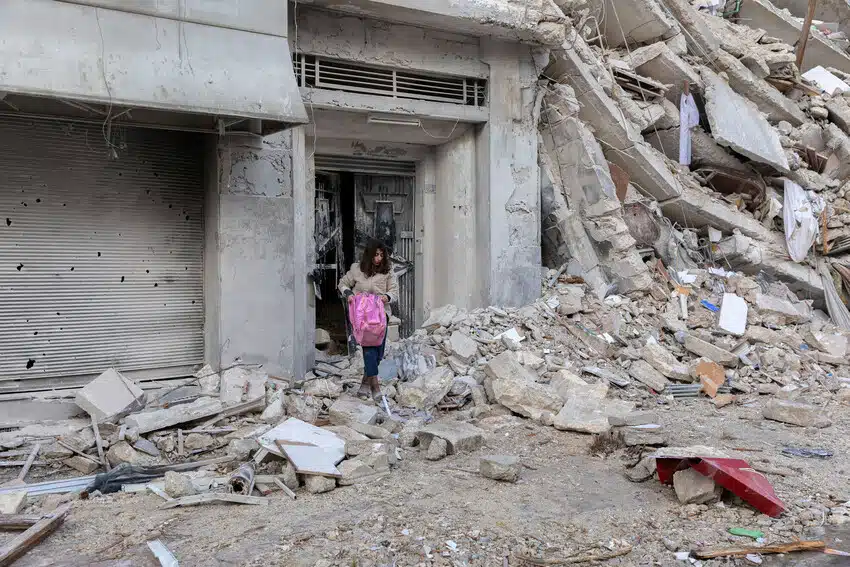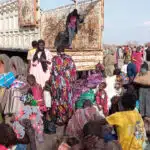Media Centre - Media release - 19 April 2023
New report finds half a million children in Syria are not in school, highlighting the urgent need for investment into education for children in humanitarian emergencies

Plan International Australia is urging the Australian Government to prioritise the right to education in emergencies by investing in Education Cannot Wait, the UN Global Fund for education in emergencies and protracted crises.
Leading child rights organisation, Plan International Australia, is urging the Australian government to prioritise protecting the rights of children to an education when they are affected by humanitarian emergencies by committing AUD $24 million over three years to the Education Cannot Wait (ECW) fund.
The call comes as a new report, From Crisis to Classroom: Understanding the Effects of Disasters on Girls’ Access to Education, is released by Plan International Australia which highlights the plight of 222 million children around the world who are at risk of missing out on an education because of armed conflicts, forced displacement, climate-induced disasters, and protracted crises.
The ECW fund is the United Nations global fund for education in emergencies and protracted crises, supporting every child’s right to access an education. The fund is up for replenishment next month, providing an opportunity for the government to renew its investment.
A critical investment into education in foreign aid by Australia could not be more urgent, with the Development Assistance Committee of the Organisation for Economic Cooperation and Development reporting last week that Australia ‘s aid generosity remains low, with Australia sitting at 27 out of 30 OECD DAC donors on aid generosity
Global North countries that have already committed to the fund include the United States (US $43 million), United Kingdom (US $96 million), Norway (US $42 million), and Canada (CA $68 million).
Recent humanitarian emergencies such as the Türkiye and Syria earthquakes, the conflict in Ukraine, the hunger crisis in the Horn of Africa, and Cyclone Freddy in Southern Africa emphasise the need to prioritise access to education in humanitarian settings and decreasing the risk to children from physical harm, early or forced marriage, early pregnancy, neglect, sexual and other forms of exploitation, and child labour if they are unable to attend school.
The report highlights the impact of humanitarian disasters on access to education, which are severely underfunded, including:
- In Somalia, 2.4 million school-aged children are affected by drought and of these, 1.7 million have dropped out of school. At least 720,000 children who were enrolled in school in 2021/22 are at risk of not returning to class.
- In Ukraine, the education of over 70% of children has been impacted since the escalation of the conflict in February 2022. By the end of January 2023, 2,631 education facilities had been damaged and 420 destroyed signalling significant reductions in learning outcomes are expected for Ukrainian students.
- In Syria, 2143 schools in Aleppo, Hama, Homs, Idleb, Lattakia and Tartous sustained damage and of those remaining, 99 are now being used as shelters for those who have lost their homes. As a result, more than 535,000 children are not able to continue their education.
- In Mozambique and Malawi some 230 schools which withstood recent Cyclone Freddy are now being used as temporary accommodation, meaning almost 500,000 primary and secondary school aged children are currently not receiving an education.
- In the Pacific, 3.8 million school aged children (5-19 years) – which includes 1.85 million girls – are at risk of natural disasters that threaten their access to education and learning.
18-year-old Hibbaq from Togdheer region in Somaliland is one of the “lucky” ones. Still in school she hopes to be able to continue her education, going to university, and becoming a teacher, but since the start of the drought, her future plans look increasingly in doubt.
“Since the drought started, we often miss school because of other priorities at home such as taking care of animals and fetching water for the family. If we leave at 8:30am to collect water, we don’t get back home until around noon, and that’s how we miss school,” explains Hibbaq.
“Children need the right support to continue their education during the drought. With the school closures and children out of school for such a long time, children are at risk of not going back to school, losing their education, and being exposed to different forms of exploitation and abuse,” she said.
In Syria, two months since the devastating 7.8 magnitude earthquake that struck the northwest of the country, it is girls and women who are most at risk due to the overcrowded living situations and insufficient access to basic services. Tens of thousands are still living in communal shelters which often lack gender segregation and partitions between families.
Carla, 16, is now staying in a temporary shelter in the basement of a church in Aleppo and is desperate to return to school. With many of the undamaged schools in Aleppo now temporary shelters, most children’s education has come to an abrupt halt. The education system in Syria was failing even before the earthquakes with around half of school age children aged 5-17 not attending school and one in three schools not being used for educational purposes.
“Our mental health is very down, everyone is crying. Children here especially cry a lot,” she said.
Plan International Australia chief executive Susanne Legena said that educating children, particularly girls, during and after an emergency was critical, creating much needed economic benefits that have the power to drive change for entire communities.
“Educating girls can increase a country’s gross domestic product (GDP) highlighting the huge economic benefits of education. If girls were able to complete 12 years of education, it could produce $15-$30 trillion to the global economy from lifetime opportunity and earnings,” Ms Legena said.
“We know that young people are desperate to learn. We know that the pressure of early marriage, the preferential treatment of boys’ education, the burden of domestic chores, and gender-based violence all prevent girls from completing their secondary education, and we know that the Australian government has the capacity to prioritise and fund education in emergencies.
“Schools save lives. The help protect children from disease through vaccination campaigns; they keep children safe from violence, abuse and sexual exploitation; they provide nutrition through crucial school feeding programs; they provide access to safe and sanitary water; and they provide a sense of stability and normalcy in times of upheaval.; they create normalcy and allow children to play and connect which is vital to their mental health.
“Education is absolutely transformative – it is time for the government to protect the rights of all children to an education, particularly when it is disrupted by circumstances outside of their control, by investing in Education Cannot Wait,” Ms Legena said.
INGOs like Plan International are prioritising education in emergencies through initiatives such as establishing safe learning facilities, uninterrupted access to inclusive, quality education and learning approaches that support children’s psychosocial wellbeing, and the provision of provision of climate change adaptation curriculum.
For adolescent girls in particular, the impacts of conflict and crisis are devastating and compound the barriers they already face in accessing primary and secondary education, exacerbating pre-existing gender discrimination and harmful practices such as child marriage and early pregnancy, which have lifelong consequences.
“Global crises like COVID-19, conflict, and climate change have made these challenges even more difficult to overcome – we know that adolescent girls in conflict zones are 90 per cent more likely than their peers in non-conflict settings to be out of school, and we must do something about it,” Ms Legena said.
“The impact of these humanitarian emergencies threatens to undo the years of progress and hard-won gains that Australia’s aid and diplomacy efforts have made for gender equality, especially in the Indo Pacific region.
“Australia can – and should – play a leading role in shaping this work, ensuring that global funding reaches emergencies in its priority countries affected by climate-induced disasters across the Indo-Pacific.”
[ENDS]
For more information, images, b-roll or interviews please contact: Claire Knox, Plan International Australia media and ambassador manager: 0452 326 549 / [email protected]
Report can be downloaded here: https://www.plan.org.au/publications/from-crisis-to-classroom/
Media contacts


